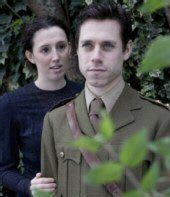Although first produced in the West End as The Enchanted Cottage in 1921, on Broadway two years later and in both a silent film version and again by Hollywood in 1945, this was a play entirely unknown to me and not what you might expect from the writer of comedies and farces such as Trelawny of the Wells, The Magistrate and Dandy Dick, though perhaps not so surprising if you think of the social criticism of plays like The Second Mrs Tanqueray. Written in the aftermath of the 1914-1918 War, it presents us with the harsh reality of the lives of mentally and physically damaged survivors and the reception they got on their return.
As in much of his more familiar work, his depiction of the bourgeois and lower middle class characters does raise a smile but, especially in director Phil Wilmott's production, they are presented here less for our amusement than as a bitter criticism of their complacency and self-obsession. We are shown the total failure of the family of shattered World War I survivor to comprehend what the men who fought had been through and its effects. There are a local rector and his wife who have professional compassion but are caught up in their domesticity, and an awkward, ugly, country girl. The other characters are all the victims of the war: a disfigured and crippled man who has shut himself away in the country, a blinded army acquaintance who comes to visit him (they were clearly officers, although it is never mentioned), the blind man's manservant, a squaddie who has lost a hand, and the housekeeper of the cripple, the widow of one of the war's first causalities.
Pinero takes this beyond the direct effect of war to question the way in which people reject or avoid the physically disturbing and cannot see beyond appearance. The angry frustrated cripple warms to the caring country girl and both see beyond outward appearances to find each other beautiful. In a sort of dream sequence, for which Wilmott has devised a rather simpler presentation than the elaborate original, even the blind man regains his sight but we have a hint that the confidence of being beautiful can also be corrupting.
The message of the piece is softened by a layer of sentiment and by the near caricature of the middle classes - which might have enabled a twenties audience to absorb it without too much discomfort, and Moir Leslie's overbearing mother and Andrew Boxer's obnoxious stepfather (who on each visit has run over another animal) don't hesitate to play them broadly. Jamie Hinds is calm and measured as the blind man: if he still has horrors he hides them under a smooth exterior. Pinero seems less interested in him than in how he serves the structure. The housekeeper's character is not developed either, though her contribution is crucial. When allowed to emerge from self-effacing propriety Nicola Wright gives her a warmth that reveals a very different woman behind the hard façade. Lachlan Nieboer has little to do or say as manservant Rigg but his physical presence when you realise that he has lost a hand is implicit with comment about the attitude of his 'betters' to the ordinary soldier.
Daniel Abelson and Laura Pennington, as the cripple Oliver Bashforth and the awkward local girl Laura, manage without the aid of 'character' makeup to suggest the change from ugliness to beauty. In the closing scenes they play with a sincerity that quite overcomes the sentimentality of the script.
Robin Don's set, with a tilted cloth painted with a country villa backed by huge strands of painted trench barbed wire and by making the setting mainly outdoors pushes the production out of the completely naturalistic and helps accommodate the two dimensional writing of many of the characters. Wilmott's direction risks Leslie's Mrs Smallwood overpowering the action but pushes the balance in favour of the underlying message. This is an intriguing revival that he has made to work in performance.
Until 9th May 2009
